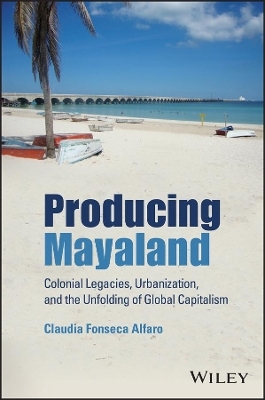
Producing Mayaland
Colonial Legacies, Urbanization, and the Unfolding of Global Capitalism
Seiten
2023
John Wiley & Sons Inc (Verlag)
978-1-119-64732-4 (ISBN)
John Wiley & Sons Inc (Verlag)
978-1-119-64732-4 (ISBN)
Producing Mayaland “Producing Mayaland powerfully captures the extent to which the abstract spaces of global capital are infused with colonial fantasies, haunted by uncanny ruins, and plagued by monstrous manifestations of ecological breakdown. Through a compelling account of the maquiladora industry in the Yucatan Peninsula, Claudia Fonseca Alfaro vividly conveys the inextricable entanglements of the capitalist production of space and the coloniality of power.”
—Japhy Wilson, School of Social Sciences, University of Manchester, UK
“In Producing Mayaland, Claudia Fonseca Alfaro finds a unique voice to narrate the contested relations between everyday life, urbanization and the uneven development of capitalism in Motul, Yucatán, Mexico. The remarkable insights of this work emerge from her innovative synthesis of critical urban theory, anticolonialism and ‘magical realism’— all grounded in an imaginative appropriation of Henri Lefebvre’s oeuvre on the production of space.”
— Kanishka Goonewardena, Professor of Geography and Planning, University of Toronto
Critical urban theory and postcolonial approaches are brought together in this compelling book to explore the relationship between colonial legacies, urbanization, and global capitalism in southern Mexico. Producing Mayaland investigates the boom-to-bust story of maquiladoras in the state of Yucatán to shed light on how the built environment was shaped by discourse, imaginaries, and everyday practices. In making sense of this social production of space, the author examines infrastructure constructed to support the maquiladora project and traces the attempts of the state to portray Yucatán as an exotic and business-friendly maquiladora paradise. These practices stand in contrast to the livelihood strategies and life stories of maquiladora workers and residents. Carefully weaving geography, history, and ethnography, the author draws on a wide range of sources to illustrate a central tension in capitalism: its tendency to homogenize while thriving in differentiation. With important insights into an understudied location, Producing Mayaland urges us to understand urbanization in the global South in new ways.
—Japhy Wilson, School of Social Sciences, University of Manchester, UK
“In Producing Mayaland, Claudia Fonseca Alfaro finds a unique voice to narrate the contested relations between everyday life, urbanization and the uneven development of capitalism in Motul, Yucatán, Mexico. The remarkable insights of this work emerge from her innovative synthesis of critical urban theory, anticolonialism and ‘magical realism’— all grounded in an imaginative appropriation of Henri Lefebvre’s oeuvre on the production of space.”
— Kanishka Goonewardena, Professor of Geography and Planning, University of Toronto
Critical urban theory and postcolonial approaches are brought together in this compelling book to explore the relationship between colonial legacies, urbanization, and global capitalism in southern Mexico. Producing Mayaland investigates the boom-to-bust story of maquiladoras in the state of Yucatán to shed light on how the built environment was shaped by discourse, imaginaries, and everyday practices. In making sense of this social production of space, the author examines infrastructure constructed to support the maquiladora project and traces the attempts of the state to portray Yucatán as an exotic and business-friendly maquiladora paradise. These practices stand in contrast to the livelihood strategies and life stories of maquiladora workers and residents. Carefully weaving geography, history, and ethnography, the author draws on a wide range of sources to illustrate a central tension in capitalism: its tendency to homogenize while thriving in differentiation. With important insights into an understudied location, Producing Mayaland urges us to understand urbanization in the global South in new ways.
Claudia Fonseca Alfaro holds a PhD in Urban Studies and is Postdoctoral Fellow in the Institute for Urban Research (IUR) at Malmö University. A postcolonial and critical scholar, her research explores how global capitalism and urbanization unfold at the local level in the inconspicuous places of the global South.
Series Editors’ Preface vi
List of Abbreviations vii
List of Figures and Table ix
Acknowledgements xi
1 Introduction 1
2 Postcolonizing Lefebvre? 30
3 Maquiladora Paradise 47
4 The Magical Maya 77
5 The Zone 103
6 The Maquila Leftovers 125
7 Understanding the Urban in/from Yucatán 168
8 Living with the Maquila 179
9 Conclusion 209
Bibliography 221
Index 250
| Erscheinungsdatum | 05.05.2023 |
|---|---|
| Reihe/Serie | Antipode Book Series |
| Verlagsort | New York |
| Sprache | englisch |
| Maße | 152 x 229 mm |
| Gewicht | 510 g |
| Themenwelt | Naturwissenschaften ► Geowissenschaften ► Geografie / Kartografie |
| Sozialwissenschaften ► Politik / Verwaltung | |
| ISBN-10 | 1-119-64732-0 / 1119647320 |
| ISBN-13 | 978-1-119-64732-4 / 9781119647324 |
| Zustand | Neuware |
| Informationen gemäß Produktsicherheitsverordnung (GPSR) | |
| Haben Sie eine Frage zum Produkt? |
Mehr entdecken
aus dem Bereich
aus dem Bereich
über eine faszinierende Welt zwischen Wasser und Land und warum sie …
Buch | Hardcover (2023)
dtv (Verlag)
24,00 €
Eine Einführung in die spezielle Mineralogie, Petrologie und …
Buch | Hardcover (2022)
Springer Spektrum (Verlag)
59,99 €


